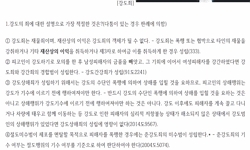This study examines the legislative background and practical implementation of the Investigator Testimony System under the Korean Criminal Procedure Act. It further analyzes the enhanced institutional significance of the system following the 2020 amen...
http://chineseinput.net/에서 pinyin(병음)방식으로 중국어를 변환할 수 있습니다.
변환된 중국어를 복사하여 사용하시면 됩니다.
- 中文 을 입력하시려면 zhongwen을 입력하시고 space를누르시면됩니다.
- 北京 을 입력하시려면 beijing을 입력하시고 space를 누르시면 됩니다.

조사자증언제도의 한계와 효율적 개선방안 = Limitations of InvestigatorTestimony System and Efficient Improvement Measures
한글로보기부가정보
다국어 초록 (Multilingual Abstract)
Introduced in 2007 as a supplementary mechanism when a defendant retracts a statement during trial, the system has seen limited practical use due to the stringent condition of trustworthiness, lack of cooperation from investigative agencies, and concerns regarding memory distortion and interpretive bias. The 2020 amendment substantially elevated investigator testimony as virtually the only viable alternative for introducing prior statements, by imposing identical evidentiary requirements on prosecutor-written interrogation records and those by judicial police officers, while abolishing the provision allowing authenticity to be established via video recordings.
Through a comparative analysis of analogous systems in the United States, Germany, France, and Japan, this paper identifies implications for systemic reform. It proposes specific institutional improvements, including the clarification of the trustworthiness requirement, reforms to evidentiary hearing procedures, and the supplementary use of written records and video recordings. Ultimately, the study seeks to strike a balance between the principle of court-centered trial and the defendant’s right to cross-examination, while safeguarding the core objective of discovering substantive truth in criminal proceedings.
This study examines the legislative background and practical implementation of the Investigator Testimony System under the Korean Criminal Procedure Act. It further analyzes the enhanced institutional significance of the system following the 2020 amendment of the Act, with a view to proposing measures for its effective operation.
Introduced in 2007 as a supplementary mechanism when a defendant retracts a statement during trial, the system has seen limited practical use due to the stringent condition of trustworthiness, lack of cooperation from investigative agencies, and concerns regarding memory distortion and interpretive bias. The 2020 amendment substantially elevated investigator testimony as virtually the only viable alternative for introducing prior statements, by imposing identical evidentiary requirements on prosecutor-written interrogation records and those by judicial police officers, while abolishing the provision allowing authenticity to be established via video recordings.
Through a comparative analysis of analogous systems in the United States, Germany, France, and Japan, this paper identifies implications for systemic reform. It proposes specific institutional improvements, including the clarification of the trustworthiness requirement, reforms to evidentiary hearing procedures, and the supplementary use of written records and video recordings. Ultimately, the study seeks to strike a balance between the principle of court-centered trial and the defendant’s right to cross-examination, while safeguarding the core objective of discovering substantive truth in criminal proceedings.
동일학술지(권/호) 다른 논문
-
미국 불법행위법상 사생활 보호에대한 고찰 -미국 불법행위 보통법전집 제2판 규정을 중심으로-
- 충남대학교 법학연구소
- 고세일
- 2025
- KCI등재
-
미국 헌법상 국교부인 원칙의최근 동향과 시사점 -정교분리 개념의 재정립 필요성을 중심으로-
- 충남대학교 법학연구소
- 전윤성
- 2025
- KCI등재
-
보안처분의 형벌성 검토 -형 집행 종료 후 부과되는 보안처분을 중심으로-
- 충남대학교 법학연구소
- 유상진
- 2025
- KCI등재
-
대상청구권의 입법화와 해석론적 쟁점 -2024년 민법 개정안을 중심으로-
- 충남대학교 법학연구소
- 정다영
- 2025
- KCI등재




 DBpia
DBpia






